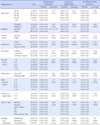Abstract
Purpose
This study was designed to assess the degree of psychological well-being, perceived health status, and health promoting behavior of clinical nurses, and to identify correlations between variables.
Methods
Participants were 194 nurses working at S hospital, Seoul and data were analyzed using descriptive statistics, ANOVA, Duncan's test, Pearson correlation coefficient, and multiple regressions.
Results
Mean scores were 3.45 (5 point scale) for psychological well-being, 2.82(4 point scale) for perceived health status, and 2.30(4 point scale) for health promoting behavior. Psychological well-being correlated positively with perceived health status (r=.34, p<.001). Perceived health status showed a positive correlation with health promoting behavior (r=.30, p<.001). There was a positive correlation between psychological well-being and health promoting behavior (r=.52, p<.001). Personal growth(t=2.85, p=.005), purpose in life (t=2.30, p=.023) among subscales of psychological well-being, and perceived health status (t=2.13, p=.034) had a significant influence on health promoting behavior. These combinations explained 32.1% of health promoting behavior (F=12.58, p<.001).
Figures and Tables
Table 1
Degree of Psychological Well-being, Perceived Health Status, and Health Promoting Behavior (N=194)

Table 2
Differences in Psychological Well-being, Perceived Health Status, and Health Promoting Behavior by General Characteristics of Participants (N=194)

Table 3
Difference of Psychological Well-being, Perceived Health Status, and Health Promoting Behavior by Health related Characteristics of Participants (N=194)

Table 4
Correlation among Well-being, Perceived Health Status, and Health Promoting Behavior (N=194)

PHS=Perceived health status; X1=Psychological well-being; X2=Positive relations with others; X3=Self-acceptance; X4=Environmental mastery; X5=Autonomy; X6=Personal growth; X7=Purpose in life; X8=Perceived health status; X9=Health promoting behavior; X10=Health responsibility; X11=Physical activity; X12=Nutrition; X13=Interpersonal relations; X14=Spiritual growth; X15=Stress management.
*p<.05; **p<.01; ***p<.001.
References
1. Ahn MK. The effect of nurse's job stress on health practice behavior. Seoul, Korea: Yonsei University;2003. Unpublished master's thesis.
2. Paik YC, Kim IS. A study on health promoting lifestyle of hospital nurses. J Korean Acad Adult Nurs. 2000; 12:477–489.
3. Barr W, Kirkcaldy A, Robinson J, Poustie VJ, Capewell S. A survey of psychological wellbeing in an adult population. Br J Community Nurs. 2005; 10:260–265.
4. Choi MR. A study on the relationship among nurse managers' job stress, hardiness and health perception. Seoul, Korea: Ewha Womans University;2012. Unpublished master's thesis.
5. Diener E. Subjective well-being. Psychol Bull. 1984; 95:542–575. http://dx.doi.org/10.1037/0033-2909.95.3.542.
6. Eom SY. A study on perception of health status and health promotion behavior of hospital nurse. Seoul, Korea: Ewha Womans University;2010. Unpublished master's thesis.
7. Han SJ. A study on the relationship between nursing organizational culture and organizational performance. J Korean Acad Nurs Adm. 2002; 8:441–456.
8. Im TL. A study on health perception and health promoting life style of mid-life women. Suwon, Korea: Ajou University;2003. Unpublished master's thesis.
9. Jung AS. A study on the relations between a health promoting behaviors and self-efficacy in general hospital nurse. Seoul, Korea: Hanyang University;2007.
10. Kim CS. Difference between psychological sense of wellbeing and spiritual sense of wellbeing followed by Christian's level. Daegu, Korea: Education Graduate School, Keimyung University;2004. Unpublished master's thesis.
11. Kim DH. Understanding experience of nurses dealing with difficult patients. J Korean Acad Psychiatr Ment Health Nurs. 2002; 11:62–77.
12. Kim HH. Job stress, fatigue and work-related musculoskeletal symptoms of hospital nurses. Seoul, Korea: Korea University;2002. Unpublished master's thesis.
13. Kim HY, Yeun EJ. A study on the relationship among health promoting lifestyle, resourcefulness, and perceived health status in hospital nurses. J Korean Clin Nurs Res. 2009; 16:17–26.
14. Kim MS. Relating factors and health promoting lifestyle of hospital nurses. Gwangju, Korea: Chosun University;2000. Unpublished master's thesis.
15. Kim MS, Kim YW, Cha KH. Analyses on the construct of psychological well-being (PWB) of Korean male and female adults. Korean J Soc Pers Psychol. 2001; 15:19–39.
16. Kim SO, So HO, Kim HL. Study on the fatigue and health promoting behavior in nurses. J Korean Community Nurs. 2003; 14:699–706.
17. Knutsson A. Health disorders of shift workers. Occup Med (Lond). 2003; 53:103–108. http://dx.doi.org/10.1093/occmed/kqg048.
18. Lee CH, Kho TS. A study on health perception, health promoting lifestyle and psychological well-being of child care teachers. Korea Assoc Early Child Educ Educ Adm. 2008; 12:23–40.
19. Lee TH. The determinants of health promoting behavior: Focusing on Seoul men and woman. Seoul, Korea: Yonsei university;1990. Unpublished master's thesis.
20. Lim KA. Analytical study on the health perception and health promotion behavior between hospital nurses and public health nurses. Seoul, Korea: Public Health Graduate School, Yonsei University;2001. Unpublished master's thesis.
21. Park AS. ICU nurses' job stress, health promoting behavior, and health status. Seoul, Korea: Yonsei University;2011. Unpublished master's thesis.
22. Park JH. Factors related to health promotion behavior in single hospital nurses. Seoul, Korea: Yonsei University;2006. Unpublished master's thesis.
23. Park MY. Effects of role strain and parenting stress of married nurses on communication coping style and psychological well-being. Seoul, Korea: Korea University;2012. Unpublished master's thesis.
24. Ryff CD. Happiness is everything, or is it? Explorations on the meaning of psychological well-being. J Pers Soc Psychol. 1989; 57:1069–1081. http://dx.doi.org/10.1037/0022-3514.57.6.1069.
25. Ryff CD, Dienberg Love G, Urry HL, Muller D, Rosenkranz MA, Friedman EM, et al. Psychological well-being and ill-being: Do they have distinct or mirrored biological correlates? Psychother Psychosom. 2006; 75:85–95. http://dx.doi.org/0.1159/000090892.
26. Seo HM. Construction of health promoting behaviors model in elderly. Seoul, Korea: Seoul National University;2000. Unpublished doctoral thesis.
27. Son HM, Ko MH, Kim CM, Moon JH. The clinical experiences of adaptation as a new nursing staff. J Korean Acad Nurs. 2001; 31:988–997.
28. Sung KS. Study on the influence of elderly patient psychological traits on health promotion behavior. Chuncheon, Korea: Graduate School of Social Welfare, Hallym University;2001. Unpublished master's thesis.
29. Temane QM. Dynamics of context and psychological well-being: The role of subjective health perceptions, personality factors and spirituality. USA: North-West University;2006. Unpublished doctoral dissertation.
30. Ware JE Jr. Scales for measuring general health perceptions. Health Serv Res. 1976; 11:396–415.




 PDF
PDF ePub
ePub Citation
Citation Print
Print



 XML Download
XML Download